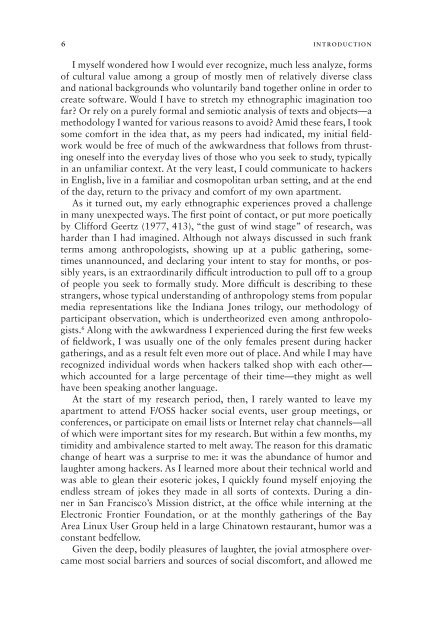V2TXZi
V2TXZi
V2TXZi
Create successful ePaper yourself
Turn your PDF publications into a flip-book with our unique Google optimized e-Paper software.
6 INTRODUCTION<br />
I myself wondered how I would ever recognize, much less analyze, forms<br />
of cultural value among a group of mostly men of relatively diverse class<br />
and national backgrounds who voluntarily band together online in order to<br />
create software. Would I have to stretch my ethnographic imagination too<br />
far? Or rely on a purely formal and semiotic analysis of texts and objects— a<br />
methodology I wanted for various reasons to avoid? Amid these fears, I took<br />
some comfort in the idea that, as my peers had indicated, my initial � eldwork<br />
would be free of much of the awkwardness that follows from thrusting<br />
oneself into the everyday lives of those who you seek to study, typically<br />
in an unfamiliar context. At the very least, I could communicate to hackers<br />
in English, live in a familiar and cosmopolitan urban setting, and at the end<br />
of the day, return to the privacy and comfort of my own apartment.<br />
As it turned out, my early ethnographic experiences proved a challenge<br />
in many unexpected ways. The � rst point of contact, or put more poetically<br />
by Clifford Geertz (1977, 413), “the gust of wind stage” of research, was<br />
harder than I had imagined. Although not always discussed in such frank<br />
terms among anthropologists, showing up at a public gathering, sometimes<br />
unannounced, and declaring your intent to stay for months, or possibly<br />
years, is an extraordinarily dif� cult introduction to pull off to a group<br />
of people you seek to formally study. More dif� cult is describing to these<br />
strangers, whose typical understanding of anthropology stems from popular<br />
media representations like the Indiana Jones trilogy, our methodology of<br />
participant observation, which is undertheorized even among anthropologists.<br />
6 Along with the awkwardness I experienced during the � rst few weeks<br />
of � eldwork, I was usually one of the only females present during hacker<br />
gatherings, and as a result felt even more out of place. And while I may have<br />
recognized individual words when hackers talked shop with each other—<br />
which accounted for a large percentage of their time— they might as well<br />
have been speaking another language.<br />
At the start of my research period, then, I rarely wanted to leave my<br />
apartment to attend F/OSS hacker social events, user group meetings, or<br />
conferences, or participate on email lists or Internet relay chat channels— all<br />
of which were important sites for my research. But within a few months, my<br />
timidity and ambivalence started to melt away. The reason for this dramatic<br />
change of heart was a surprise to me: it was the abundance of humor and<br />
laughter among hackers. As I learned more about their technical world and<br />
was able to glean their esoteric jokes, I quickly found myself enjoying the<br />
endless stream of jokes they made in all sorts of contexts. During a dinner<br />
in San Francisco’s Mission district, at the of� ce while interning at the<br />
Electronic Frontier Foundation, or at the monthly gatherings of the Bay<br />
Area Linux User Group held in a large Chinatown restaurant, humor was a<br />
constant bedfellow.<br />
Given the deep, bodily pleasures of laughter, the jovial atmosphere overcame<br />
most social barriers and sources of social discomfort, and allowed me


